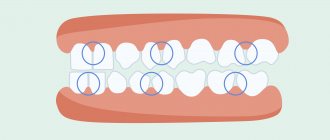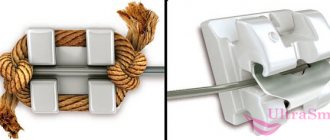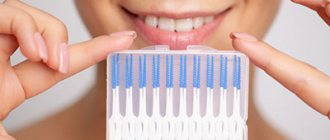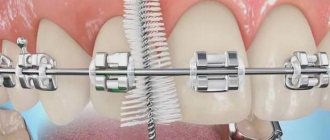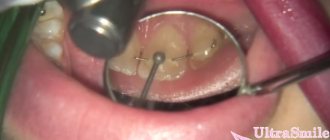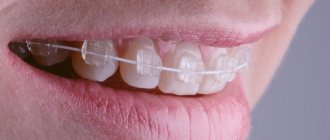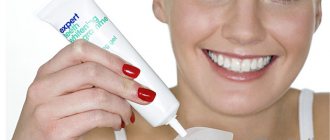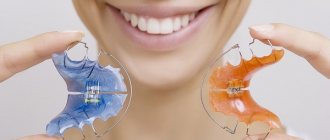Wearing braces does not replace the need to take care of your teeth. During the period of correcting the bite, the issue of hygiene arises especially acutely, because neglecting this point can lead to the development of caries. Treating teeth while wearing braces is inconvenient and undesirable, so it is better to prevent the problem than to solve it. Following simple care recommendations can significantly reduce the risk of inflammation or diseased teeth.
It is important to understand that the orthodontic structure itself in the mouth already increases the risk of plaque and tartar formation on the teeth and can cause inflammation in the oral cavity and gums. This does not mean that you need to abandon bite treatment, but it is necessary to increase attention to care issues.
General rules for caring for braces
If you want to maintain healthy teeth, you must follow the general rules for caring for braces. Let's describe them briefly:
- For braces, special toothbrushes are used that allow you to clean the enamel and all elements of the orthodontic structure.
- Treatment of the oral cavity should be performed 4-5 times a day or more often (after all meals, as well as in the morning and evening).
- It is necessary to clean not only the teeth themselves, but also all accessible surfaces of the braces.
- It is advisable to buy toothpaste with a high content of fluoride and calcium to increase the protective properties of the enamel. For the paste to be effective, it is recommended to regularly change it to a product from another company, since the enamel gets used to a certain composition and stops reacting to it.
- If you cannot clean some places, you should resort to the help of additional devices: dental floss, special brushes, etc.
- If you use rinse aid, do not use regular brands, but only ones that do not contain alcohol or dyes.
The main task of caring for the oral cavity while wearing braces is to preserve the enamel. This can be done in different ways. Read for interest what scientists are offering today: Scientists have found a way to protect tooth enamel in cancer patients...
Is it necessary to carry out hygienic cleaning before installing braces?
If there is evidence for this, then it is necessary, since braces must be installed on clean enamel. It is important that there is no accumulation of plaque underneath them, otherwise caries may develop under the braces. In addition, if there is a lot of plaque, it will be difficult to remove it with braces - it is better to do this before the system is fixed.
However, if you have recently had dental hygiene, it is better to postpone the procedure a little and go through it 2-3 months after installing the braces system - it will be much more effective.
How to brush teeth with braces?
Brushing your teeth is a must if you wear braces. The procedure takes 10 minutes or more - it all depends on how easily you can use a special orthodontic toothbrush for braces . General recommendations for daily cleaning:
- Remove all removable elements of the bracket system and thoroughly clean them using water and special products.
- Rinse your mouth with water to remove all small food particles.
- Clean your teeth using horizontal and vertical movements. The locks of brace systems are cleaned only vertically.
- Finish the procedure using specialized brushes, cleaning the interdental space.
- Rinse your mouth with mouthwash and return all elements of the orthodontic frame to their place.
If you wear a bite correction system for more than six months (and this almost always happens), you must also undergo a special procedure in the clinic. Professional cleaning is required every six months. It allows you to remove plaque and other contaminants that are very difficult to remove on your own. This procedure also reduces the risk of inflammation on the gums or palate.
Recommendations for selection
Experts recommend purchasing all the necessary brushes for cleaning teeth with braces separately. This will allow you to inspect them better, check the stiffness of the bristles and other characteristics. In this case, it is important to pay attention to the shape of the handle, since it should be comfortable to hold when performing all the necessary manipulations. This especially needs to be taken into account when buying brushes for children.
The iOrtho clinic network provides high-quality services for correcting malocclusion with Invisalign aligners, sign up for a consultation now!
Types of orthodontic brushes
Due to the special structure of braces, it is not possible to use ordinary oral hygiene items to clean them. The use of ordinary brushes does not help to effectively clean the oral cavity, because the bristles simply do not reach many places. But scientists have developed many different specialized brushes for cleaning braces , which take into account all the features of this bite correction system.
There is an opinion that while wearing braces, you can use a regular brush, the main thing is to take a product with soft bristles. Dentists think differently: studies have shown that ignoring specialized products doubles the likelihood of developing caries!
V-shaped
The V-shaped brush is very similar to a regular brush. The only difference is that in the central part in the longitudinal direction the product has a reduced bristle length. It is believed that this form allows you to simultaneously clean the enamel, on which there are no braces, and the braces themselves. Among these brushes there are standard ones (with bristles) and non-standard ones (with rubber pads or rubber bristles). Whether it is worth using newfangled solutions should be checked with a doctor.
Standard V-shaped brushes
Monobeam
A mono-tuft toothbrush for cleaning braces has only one tuft of bristles on a plastic handle. It is very thin, so it easily cleans surfaces that are inaccessible to ordinary brushes. This product is used after a regular brush and brush: it is designed to remove all those small food debris that other cleaning devices cannot reach.
Some people think that using a single-tuft brush is not necessary, but this is not true. It helps remove dirt around the locks, which is very important. If you do not clean this area, you will see discoloration of the enamel after your braces are removed.
An example of a monotuft brush and its application
Electrical
Electric brushes can be used with braces , but be very careful. If you bought a model in which the head makes rotational movements, you cannot use it - the bristles may get stuck in the metal structures. Dentists do not recommend using a working head in the area of braces; it is dangerous and can lead to breakage of the locks. In addition, electric models are designed for routine care, so they are not enough for full care.
You can combine specialized tools such as brushes and mono-tuft brushes and an electric model. In this case, the surfaces of the teeth that are not covered by braces are automatically cleaned, and the rest of the enamel is cleaned manually.
Advice! If your budget allows, in addition to a special brush, also buy an irrigator. It does not replace brushing your teeth, but helps remove plaque and food debris with water. You can also rinse your teeth with medications, this reduces the risk of inflammation and gum disease.
Cleaners
Brushes for braces are used to clean the spaces between the arch and teeth. They consist of a holder and replaceable heads, each of which lasts no more than 2 weeks. The holder can be of any shape and often resembles a brush handle. The head itself looks like a small wire base on which there are bristles sticking out in all directions.
Types of dental brushes and an example of their use
Cleaners are classified according to the following parameters:
- the shape of the working part. Models come in conical and cylindrical. Conical ones taper towards the end, cylindrical ones have a constant nozzle width;
- the stiffness of the bristles, which can be hard or soft. The latter is used for sore gums or increased sensitivity;
- size. It is recommended to use brushes of different sizes for different teeth, because... the distance between the elements of the dentition can vary over a fairly wide range.
Regardless of their hardness, brushes do not last long. It is recommended to take them in sets so as not to run to the store for your next purchase as soon as the bristles of the brush you are using wear out.
Sizes of brushes and features of interdental cleaning
Sets
To care for your teeth during the period of bite adjustment, you need a lot of equipment. You don’t have to buy them separately: you can immediately buy a set, which will include a toothbrush with braces , a brush, and a mirror. The main thing is that such a set includes all the products necessary for care.
Two examples of dental care kits
The minimum configuration is as follows:
- v-shaped brush;
- toothpaste;
- waxed floss for dental purposes;
- floss toothpicks or dental brushes;
- mono-beam brush;
- mirror.
Even such a small specialized kit will help you take full care of your teeth. An additional advantage of buying a set is that it is usually sold in special packaging that is convenient to carry with you. The kit is also suitable for travelers. But do not forget that brushes quickly become unusable and need to be replaced.
Advice! If you find the kit inconvenient for constant use, you can purchase two sets of accessories. You will carry one with you when eating at a restaurant or dining out, and use the other at home.
How to properly care for braces: 10 dentist recommendations
Dentists recommend not only using special devices and toothbrushes for braces , but also following simple care rules. Namely:
- Teeth should be brushed after every meal. This is important, because when eating, braces retain a lot of leftover food. They quickly become the cause of bacteria, which leads to inflammation and caries.
- While wearing braces, it is better to avoid hard foods (nuts, seeds, popcorn), as they can damage the orthodontic structure.
- It is undesirable to consume viscous products (halva, toffee, chewing gum). Such food not only gets stuck between the teeth and the elements of the braces system, but can cause damage to the lock on the tooth. Problems especially often arise with toffee and chewing gum.
- It is recommended to avoid foods that are too hot or too cold. Temperature changes destroy the substance that holds braces on the teeth.
- Do not use ultrasonic brushes for cleaning. They are good and can and even should be used, but they are not designed for the presence of braces and other foreign elements on the teeth.
- It is undesirable to eat products with natural or artificial dyes - all the paint will eventually remain not only on the enamel, but also on the braces (especially on cheap models).
- Visit the orthodontist in a timely manner so that the doctor can monitor the condition of the teeth and recommend the remedies that need to be used to normalize the situation.
- Combine careful care with proper nutrition. Make sure your diet contains calcium, magnesium, vitamins (especially C, D), fluorine, phosphorus, proteins, etc. It is useful to include dairy products, fish, vegetables and fruits in your menu.
- Don't forget about dental floss. You need to buy it specially, because the regular one is not suitable for braces. The most convenient option is Superfloss thread. It is divided into small pieces and has a thin and hard end. It is easy to thread under the arch and stick into hard-to-reach places.
- Choose your toothpaste carefully. A good toothpaste will help reduce tooth sensitivity. This is especially important for those who suffer from discomfort associated with wearing braces. Before purchasing, examine the tube and make sure that the paste is intended to strengthen enamel.
You cannot ignore the advice of dentists, because this will negatively affect the health of your teeth. Take the time to care for your oral cavity; it is already subject to increased stress due to braces.
Conclusions. Expert advice
Wearing braces is a special time when your teeth require extra care. If it is important for you to keep your enamel in excellent condition and avoid caries, then you need to follow simple rules: brush your teeth regularly, use specialized products, change your diet so that food does not damage the orthodontic structure.
Dental care during the period of bite correction is performed using special means, namely:
- v shaped brush for braces with a special shape of bristles;
- single-tuft brushes that allow you to remove plaque and food debris from hard-to-reach places;
- brushes and specialized dental floss, with the help of which dental spaces are cleaned.
Care devices can be purchased individually or taken as a set. The set usually includes the minimum necessary items in a convenient package that you can carry with you to work or school.
Floss (dental floss)
For patients with braces, there is a special dental floss that has a denser (sharp) tip and a spongy (absorbent) base. Thanks to the dense tip, the floss is easy to insert into the interdental space or under the orthodontic arch. This dental floss is called Super Floss. Companies that produce Super Floss threads are Curaprox and Oral-B.
